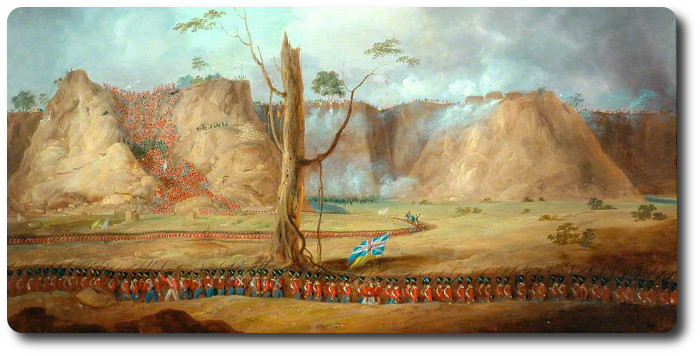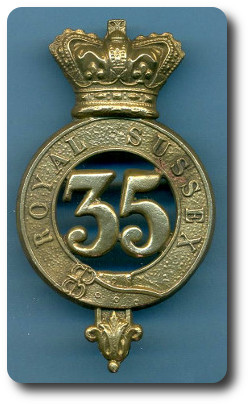Topic: Officers

An Officers' Breakfast at the Siege of Bhurtpoor
Cadet to Colonel, Vol I, Major-General Sir Thomas Seaton, K.C.B., 1866
 One of our most agreeable duties [at the Siege of Bhurtpoor, 1825] was that of being sent as a working party into the forest, felling trees to form an abattis to prevent the enemy's horse from making sorties and annoying our camp. These occasions were regular picnics, each officer taking his own dinner with him, and when all were put together any stranger officer was heartily to our feast. But the duty we liked best of all was duty in the trenches. We had several reasons for this preference. One was that our doctor, who was a capital fellow, always organized a grand breakfast for us in the parallel near Baldeo Sing's garden on the right. At 9 o'clock, when all was quiet, we used to leave our native officers in charge of our companies and go to breakfast. Our table was laid at right angles to the trench, not, perhaps, the most prudent position which we could have placed it, but, from the formation of the trench, just then very convenient. Our kitchen was behind the trunk of a large tree close at hand, and the regimental doolies (litters) were our plates, baskets, and larder. No one sat at the outer end of the table, where our empty plates, teapots, cups, and saucers were put, and fortunate it was that no one selected that position, for one morning a chance shot from the fort struck the top of the parapet, covered us with clouds of earth and dust, knocked off the teapot, smashed the empty crockery, and cleared the end of the table. The cloud of dust, the flying clods, the crash of the broken crockery, the whiz of the shot, made all our servants think that at least half of us were killed, one of them, the doctor's servant, began to cry and beat his breast, singing in most doleful tones, "Bap re bap. Bap re bap. Oh dear; oh dear! Mere sahib l'g; mere sahib l'g. My poor masters; my poor masters!" Hearing us laugh, however, he started looking thoroughly indignant that we could appreciate his grief; and perhaps he was a little disappointed at having lost an opportunity displaying his talent. He would have made a capital professional howler at funerals.
One of our most agreeable duties [at the Siege of Bhurtpoor, 1825] was that of being sent as a working party into the forest, felling trees to form an abattis to prevent the enemy's horse from making sorties and annoying our camp. These occasions were regular picnics, each officer taking his own dinner with him, and when all were put together any stranger officer was heartily to our feast. But the duty we liked best of all was duty in the trenches. We had several reasons for this preference. One was that our doctor, who was a capital fellow, always organized a grand breakfast for us in the parallel near Baldeo Sing's garden on the right. At 9 o'clock, when all was quiet, we used to leave our native officers in charge of our companies and go to breakfast. Our table was laid at right angles to the trench, not, perhaps, the most prudent position which we could have placed it, but, from the formation of the trench, just then very convenient. Our kitchen was behind the trunk of a large tree close at hand, and the regimental doolies (litters) were our plates, baskets, and larder. No one sat at the outer end of the table, where our empty plates, teapots, cups, and saucers were put, and fortunate it was that no one selected that position, for one morning a chance shot from the fort struck the top of the parapet, covered us with clouds of earth and dust, knocked off the teapot, smashed the empty crockery, and cleared the end of the table. The cloud of dust, the flying clods, the crash of the broken crockery, the whiz of the shot, made all our servants think that at least half of us were killed, one of them, the doctor's servant, began to cry and beat his breast, singing in most doleful tones, "Bap re bap. Bap re bap. Oh dear; oh dear! Mere sahib l'g; mere sahib l'g. My poor masters; my poor masters!" Hearing us laugh, however, he started looking thoroughly indignant that we could appreciate his grief; and perhaps he was a little disappointed at having lost an opportunity displaying his talent. He would have made a capital professional howler at funerals.
One morning, when we were in the midst our breakfast, laughing and enjoying ourselves, Lord Combermere passed on his way to inspect the works. "What officers are those?" he asked.
"The 35th, my Lord."
"Comfortable dogs, let 'em alone."

